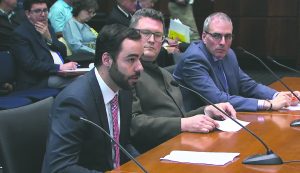No sure bets yet on plan to legalize sports gambling in Illinois
By Grant Morgan Capitol News Illinois — April 28, 2019
During a House subcommittee hearing on Thursday in Chicago, (from left) Jake Williams of iDEA Growth, Bob Greenlee of Tusk Strategies and marketing professional Robert Davidman testify about the potential for legalized sports gambling in Illinois. There are five plans being considered in a bill sponsored by Rep. Michael Zalewski (D-Chicago). More hearings are planned to determine which option will be advanced. (BlueRoomStream.com)
SPRINGFIELD — With five plans being considered, it’s anyone guess what legalized sports gambling will look like in Illinois if the Legislature approves a bill this spring.
One element of several of those plans might not yet be a safe bet. The wisdom of having a $10 million one-time licensing fee was questioned during a second hearing on sports gambling by the House Revenue and Finance subcommittee on Thursday in Chicago.
Testimony from the hearings will be used to reconcile the plans proposed in Rep. Michael Zalewski’s (D-Riverside) holder bill, House Bill 3308.
The proposed licensing fee would be paid by sports betting operators, such as casinos, race tracks or online platforms.
“If the licensing fee is too high, it’s going to prohibit people from entering the market,” said Robert Davidman, a marketing professional who has helped launch several online gaming businesses in New Jersey, widely considered to have the most comprehensive sports betting system of any state.
Davidman said fees that other states are considering, $100,000 in Indiana and $45,000 in Iowa, are better.
Pennsylvania, where the fee is $10 million, has not sold all of its available licenses, Davidman said.
In his proposed fiscal year 2020 budget, Gov. J.B. Pritzker uses the sale of 20 licenses as a source of more than $200 million in new revenue.
A safer bet among the proposals might be the allowance of mobile betting.
“Mobile sports wagering is not only the future, it’s the now,” said Jake Williams of iDEA Growth, a not-for-profit sports betting association.
He said mobile betting accounts for roughly 80 percent of New Jersey sports wagers.
Zalewski, who is the subcommittee chairman, agreed.
“We’ve become aware that states that don’t have a mobile piece don’t fare very well,” he said.
That is bad news for one of the state’s proposed plans, which would have sports betting overseen by the Illinois Lottery without any online component.
Then, there is the question of which sports to include.
Larry Lyons, athletics director at Illinois State University, spoke on behalf of most of the state’s 13 schools with Division I athletics.
“We are in agreement that we oppose legalized gambling on college sports,” he said, because it brings bettors too close to young athletes who are still maturing.
But others said there still would be illegal gambling on college sports if they are not included in the bill.
One emerging sport that could be included is electronic gaming, or eSports competitions for games like DOTA II, League of Legends and Fortnite.
Bob Greenlee of eSports company Tusk Strategies argued that eSports are more popular and professional than many people think.
Arguably the nation’s best Fortnite player, Illinois resident “Ninja” Blevins, made as much as $10 million in sponsorships last year.
A 2018 League of Legends tournament, meanwhile, attracted 205 million live viewers, compared to just more than 100 million viewers of the Super Bowl that year.
“eSports is a real thing,” said Margo McDermed (R-Mokena), adding that she learned about it recently while on Netflix.
“I hadn’t really considered it as something Illinois should include in our future gaming, but perhaps we should,” she said.
Greenlee said a company analysis puts state tax revenue from eSports betting alone at $18 million a year.
Also at Thursday’s hearing, Grace Hou, head of the state’s Department of Human Services, said next year the department needs almost double its historical budget of $1 million for gambling addiction services, but not because of sports betting.
“People often struggle with turning themselves in, so we need more marketing and outreach,” Hou said.
But Anita Bedell, executive director of Illinois Church Action on Alcohol and Addiction problems, said legalizing sports betting will only increase addiction.
“Rather than address the problem, you want to make it worse by putting it on phones,” Bedell told lawmakers.
No date has been set for the subcommittee’s next hearing on sports gambling.
gmorgan@capitolnewsillinois.com







